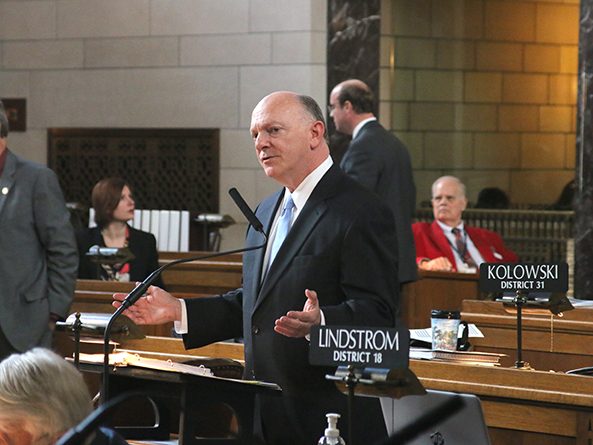Bill to cut taxes, reduce ag land valuation falls short
A bill that would cut the state’s top income and corporate tax rates if projected state revenue growth meets certain targets and change the way agricultural land is assessed stalled on general file May 2.
As introduced by Sen. Jim Smith of Papillion, LB461 proposed a technical change to state tax law. A pending Revenue Committee amendment would replace the bill and incorporate provisions from several other bills that would change the state’s method for valuing agricultural and horticultural land to an income-based approach, use economic growth rates to trigger income tax cuts and change income tax rates and personal exemption amounts.
Tax cuts, credits
Assuming 3.5 percent growth, Smith said, state revenue still would increase by about $175 million a year after tax cuts are triggered — enough to cover necessary increases in state spending and to replenish the state’s cash reserves.
“If we don’t do this, we are going to continue to face these budget woes,” Smith said. “This tax bill as amended will position our state for growth and will provide tax relief that our families and businesses deserve.”
The bill would collapse the bottom two individual income tax brackets — with rates of 2.46 percent and 3.51 percent, respectively — into one bracket, which would pay a rate of 3.25 percent, in 2019. The new bottom bracket would include those earning up to $17,999 if filing as an individual and up to $35,999 if married filing jointly.
Nebraska’s top individual income tax rate for those earning $29,000 or more if filing individually and those earning $58,000 or more if filing jointly would be reduced in eight increments by roughly 0.1 percent per year. These reductions would begin in 2020 if the expected rate of revenue growth from year to year exceeds 3.5 percent. Assuming cuts were triggered every year, the rate would drop from 6.84 percent in 2020 to 5.99 percent in 2027, for a total reduction of 0.85 percent.
Sen. Burke Harr of Omaha opposed the bill and filed several motions to extend debate. He said the bulk of the tax cuts would go to the wealthiest Nebraskans and that supporters had not proven that tax cuts would stimulate the economy. Harr also said lawmakers did not have enough time to analyze the major changes to tax policy proposed by LB461 and several pending amendments.
“When a bill comes out of committee, it needs to be ready for prime time,” he said. “We’re not saying no to taxpayers — we’re saying no to a bad bill.”
The bill would give tax credits to low-income earners and increase the earned income tax credit from the current 10 percent to 11 percent in 2019 and 12 percent in 2020.
The bill also would decrease the state’s top corporate income tax rate from 7.81 percent to 7.59 percent in 2019. Beginning in 2020, it would reduce the rate by 0.2 percent per year if the projected rate of state revenue growth exceeds 4 percent for the next fiscal year. The cuts would continue until the rate reaches 5.99 percent.
To help pay for the cuts, the bill would eliminate income tax exemptions for some high earners, Smith said. LB461 also would suspend two tax credit programs: the New Markets Job Growth Investment Act and the Nebraska Job Creation and Mainstreet Revitalization Act.
Agricultural land assessments
The bill also calls for agricultural and horticultural land to be assessed using an income-based approach instead of the current market value approach beginning in 2018.
A new committee led by the state tax commissioner would establish capitalization rates for each class of agricultural or horticultural land, including irrigated cropland, dryland cropland, grassland used for grazing, grassland use for haying, wasteland, nurseries, feedlots and orchards.
The committee would ensure that aggregate agricultural use value for each class of land is between 55 and 65 percent of the actual value and the bill would cap annual growth in aggregate agricultural use value at 3.5 percent.
Sen. Joni Albrecht of Thurston supported the bill, saying it provides responsible and conditional tax relief for workers, small businesses and farmers, even if it does not go far enough to reduce property taxes on agricultural landowners.
“Something is better than nothing,” she said. “If we don’t take action on this issue, we’ll be right back to where we began.”
Albion Sen. Tom Briese also opposed the bill, saying that it focuses too heavily on providing income tax relief instead of property tax relief.
“LB461 is simply another proposal that works around the edges on property tax relief,” he said. “Any changes found in LB461 do virtually nothing to reduce our overall reliance on property taxes.”
After six hours of debate on general file, Smith filed a motion to invoke cloture, or cease debate and vote on the bill. The motion failed 27-9. Thirty-three votes were needed.


